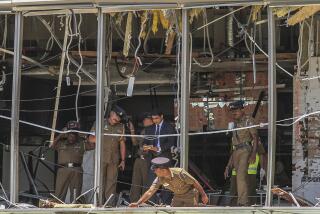64 Civilians Killed in Sri Lanka Blasts
- Share via
COLOMBO, Sri Lanka — Government forces bombed rebel Tamil Tiger positions Thursday after a pair of powerful mines ripped apart a civilian bus and killed 64 people in the deadliest attack since the two sides declared a truce four years ago.
The violence heightened fears of a return to civil war in this island nation, despite both parties’ insistence that their official cease-fire agreement remained in effect. Government spokesman Keheliya Rambukwella emphasized that there had been no formal resumption of hostilities, but added that officials would have to reassess the agreement in light of the attack.
The rebels, whose group is formally called the Liberation Tigers of Tamil Eelam, denied responsibility for the explosion. In a statement, the group accused Sri Lankan forces of orchestrating the attack “with the sole aim of blaming the LTTE.”
The claymore mines used in the attack were similar to those the Tamil Tigers have used against the military in a series of attacks and counterattacks that have left about 700 dead since December and the cease-fire in tatters.
Thursday morning’s explosion struck a bus crammed with commuters and schoolchildren in the northern town of Kebitigollewa, which borders territory controlled by the insurgents.
Rambukwella said the explosion was a deliberate attack on civilians and not a rebel assault on soldiers gone awry. “This was not an accident, as the army does not use this road,” he said. “So the motive was very clear.”
Police said the two mines apparently were hung from trees, not planted in the ground, for maximum impact -- a common rebel tactic. The explosives, detonated remotely, were packed with ball bearings to inflict heavy damage.
The blast flipped the bus over, trapping passengers inside, witnesses said.
“There was blood and body parts everywhere,” survivor Chintha Irangani told the Reuters news agency. “I fell unconscious. I saw my children’s bodies at the hospital.”
Among the dead were 15 youths, authorities said. The victims were primarily Sinhalese, the ethnic group that dominates Sri Lankan politics and is the majority in the southern and western parts of the country. The rebels’ goal is to establish a separate homeland in the north and east for the minority Tamils.
Within hours of the attack, the Sri Lankan air force bombed Tamil Tiger positions in the north. The rebels also came under artillery fire in the east, near the port city of Trincomalee. There was no word on casualties among rebel forces.
Each side accused the other of engineering Thursday’s violence to stoke ethnic unrest in a brutal conflict that has claimed more than 64,000 lives since 1983.
Peace seemed on the horizon in 2002 when the government and the Tamil Tigers agreed to put down arms and negotiate. Several rounds of talks have been held, most recently in February.
But the peace process has broken down amid escalating attacks by rebels and amid what critics say is government foot-dragging in addressing Tamil grievances. Last week, a meeting scheduled in Oslo to discuss the Scandinavian mission monitoring the cease-fire ended before it began when Tamil Tiger negotiators refused to sit down with Sri Lankan government representatives.
The Tamil insurgents also are angry at the European Union’s recent decision to classify their group as a terrorist organization, following the lead of the United States, Canada and Britain.
Late last month, a diplomatic coalition that includes the U.S. urged the rebels to renounce violence and return to talks. At the same time, it warned the government that billions of dollars in foreign aid to Sri Lanka could be in jeopardy if officials did not address Tamil demands and stop attacks on the rebels by rogue armed groups.
Times staff writer Chu reported from New Delhi and special correspondent Rutnam from Colombo.
More to Read
Sign up for Essential California
The most important California stories and recommendations in your inbox every morning.
You may occasionally receive promotional content from the Los Angeles Times.










